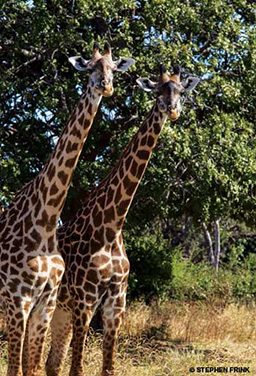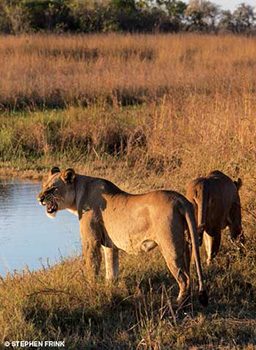Being eaten alive by wild animals has to be one of the most terrifying thoughts a person could have. The thought was running through my son’s mind as he lay helplessly on the ground with a fractured pelvis on Nov. 10, 2000, in Namibia’s Etosha National Park.
Etosha National Park is a mosaic of savanna, dolomite hills, endless salt flats and near-impenetrable bush, and it’s Namibia’s flagship conservation area. The ruggedly beautiful landscape is what attracted Gary Robert Fisher (my son, Rob) and his good friend, Scott Anderson, to rent a vehicle and explore that part of the world.

It was the last day of a two-week safari for the two veterinarians and experienced adventurers. They were driving a Land Rover when they spotted a giraffe a few feet from the road. Rob stopped the vehicle and got out to take a quick photo. Before he got the picture, though, the giraffe took off across the savanna.
I have been a safety professional for my entire career and taught my children the value of seat belts. But as Rob jumped back into the vehicle, distracted by the excitement of the close encounter with the magnificent animal, he didn’t buckle up. A minute later, as he and Scott drove westward, disaster struck. They hit a bad spot of gravel, and the car began to fishtail. The wheels hit a ditch that ran parallel to the road, and the Land Rover flipped and rolled three or four times. Scott recalls spinning, multiple impacts and terrible noise as the car was destroyed all around him. He opened his eyes to discover that the Land Rover’s roof and hood had been torn off, and he was horrified to find Rob’s seat empty.
Fortunately, Scott was OK. He scrambled out of the car and quickly found Rob lying about 10 yards away. He was alive and coherent but in excruciating pain and unable to move. As Scott worked to help Rob as best he could and the pair tried to figure out what to do, Rob passed the next few hours lying on the ground. Night was approaching, and they began to hear lions roaring in the surrounding brush. Rob was helpless, and they had no way of defending themselves.
In a stroke of luck, two park veterinarians drove up in a truck. They radioed for an ambulance and even managed to arrange for a medevac jet to be dispatched from the hospital in Windhoek, 300 miles away. They also had medical supplies and began tending to Rob’s injuries.
After 45 minutes passed without any sign of the ambulance, a pickup truck with a mattress in the back pulled up. When Scott told the driver they were waiting for an ambulance, the driver replied, “This is the ambulance, and the lions will be here by sundown. Time to go.” They lifted Rob, who was in agony, onto the mattress.
Slowly, with Rob grimly enduring the pain caused by every bump in the road, they drove away. Approaching the nearby town of Okaukuejo in darkness, they saw a dozen vehicles assembled, their headlights illuminating a flat area where the medevac jet could safely land. Moments later the plane landed, and a doctor and two nurses rushed out with a stretcher. They took Rob aboard, and within 10 minutes the jet was airborne again.
Scott received a report from the hospital a short time later: Rob had suffered a fractured pelvis, several fractured ribs, pulmonary contusions and severe lacerations to his ankle, hip and elbow. The surgeon said it would be safest to treat him there rather than evacuate him to the U.S.; the risk of nerve trauma was too high to safely move him.
When Scott called to tell me about the accident and Rob’s condition, I was dumbfounded, dazed and unable to think clearly. My wife, Kolleen, brought me to my senses, telling me to get on a plane to Windhoek to be with my son as soon as possible.
I finally arrived at the hospital after a very long and worrying trip, and I looked down at Rob’s face, fearing I might be seeing him for the last time. His lungs were full of fluid, and the doctors told me they could not operate on his hips until they cleared his lungs. That night as I walked back to the bed and breakfast where I was staying, I looked up at the brilliant stars and prayed I would see my son alive in the morning.

When I got to the hospital the next morning, I was overjoyed to find Rob looking much better. He told me that until I arrived he felt like he was ready to pass on but that now he was ready to fight and get better.
The hospital staff was outstanding. Every day a physical therapist worked on Rob, and she showed me how to massage his legs to help reduce the risk of blood clots. I went to the American embassy and spoke to the ambassador, Jeffrey Bader, who told me he would send his doctor to check on Rob. When the doctor came to the hospital and saw my son, he said, “I know you, you’re my dog’s veterinarian — I took my dog to you at the California Animal Hospital in Santa Monica!” It’s a small world.
Kolleen was an angel during the whole ordeal. She kept the emails flowing among family and friends — many people were sending Rob good wishes for a quick recovery. She also spoke with a DAN® medical information specialist, who helped her file a claim and provided logistical support. I had not heard of DAN before my son’s accident. When I asked Rob about it he told me what a great organization it was, that he and Scott had been with DAN for years and that I should look into it. I did, and I have had a family membership since 2000. I know that if disaster ever strikes, even in a remote corner of the world, and a medical evacuation must be implemented quickly, DAN won’t delay. In helping to save my son’s life, DAN proved its commitment to its clients. Scott told me that he has traveled to both poles and every continent and that his DAN membership and insurance have been with him every step of the way.
Scott and Rob still travel together often. In January 2013 they went on a dive vacation to the Great Barrier Reef, and of course, they both took their DAN membership cards with then. I am eternally grateful to Scott for saving my son’s life and to DAN for transporting Rob and me back home to California. I am proud to tell others about this great organization and what it did for my son and me. I would recommend membership to anyone who travels, whether they dive or not.
© Alert Diver — Q2 Spring 2013